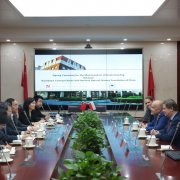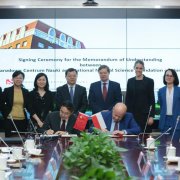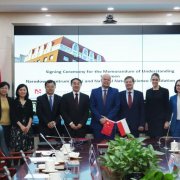On the 7th and 8th of March the Council of the NCN held its session. On the first day the Council’s committees for appeals, regulations and procedures, and Committees K-1, K-2 and K-3 convened. On the second day, the plenary debate took place, with members of the Council and authorities of the NCN.
In the first part of the meeting, members of the Council issued a positive opinion on the Centre’s financial report for the past year in resolution no 14/2018. In resolution no 15/2018, the Council approved the report on the completion of the NCN’s statutory tasks in 2017, which included information on the degree to which specific tasks had been accomplished by the Centre, supported with the tasks’ evaluation and an assessment of their impact on the advancement of science. All documents reviewed by the Council will be presented to the Minister of Science and Higher Education for approval.
The focus of the plenary debate for the Council was to determine the conditions for the 15th edition of the OPUS and PRELUDIUM calls. As a result, research projects granted funding under these schemes will receive the aggregate sum of more than € 69.5 million for OPUS and nearly € 7 million for PRELUDIUM. In accordance with former decisions by the Council, applicants in the upcoming edition will be required to write the abstracts and both the short and long description of the project in English, so that foreign reviewers will be able to participate in the evaluation process from the very beginning
The Council also discussed the proposals to change the regulations on the mode of granting financial resources for the completion of tasks funded by the National Science Centre as regards research projects, post-doctoral fellowships and doctoral scholarships, finally to be adopted as resolution no 16/2018. Following a discussion of the extant restrictions on applying for NCN grants, the Council decided to uphold the rule stipulating that a person already acting as principal investigator to more than two NCN-funded projects or acting as PI to two projects, with another project pending evaluation, may not submit a proposal as principal investigator. Members of the Council decided that the principle would not apply to international calls operated by the NCN as bi- or multilateral cooperation. After a prolonged discussion regarding the criteria of exclusion for proposals rejected in the preceding edition of the OPUS and PRELUDIUM calls, it was agreed that it would only be allowed to submit the same proposal once within 12 months. The limitation will not apply to proposals which: in the previous edition of the calls did not make it through the eligibility check, were not approved for the second stage of the merit-based evaluation solely for failing to meet the call’s requirements, for ineligible costs or submission to the wrong panel, as well as those which were approved for the second stage of the evaluation but received no funding recommendation.
With a view to meet the expectations of the applicants and the Centre’s efforts to facilitate call procedures and grant implementation, the Council agreed to apply modifications to the texts of a number of provisions in the regulations as regards eligible costs, the budget for full-time and additional salaries and the budget for scholarships. The changes will enable the applicants to plan their costs more effectively, which will undoubtedly have positive consequences for grant implementation. The OPUS 15 and PRELUDIUM 15 calls will be announced on 15th March 2018, with specific terms set out in resolutions no 17/2018 and 18/2018.
In the further stages of the session, members of the Council debated over future editions of the SONATA, SONATA BIS, MAESTRO and HARMONIA calls. After the discussion on the SONATA call, in view of the opinions of NCN coordinators on the previous call, the Council decided to introduce changes in the call’s timeline. It was agreed that the SONATA call will be launched in September 2018 alongside the next edition of OPUS and PRELUDIUM. Evaluation of proposals received under the call will be subject to discussion at future sessions of the Council. With regard to the closing of the first edition of the DAINA call, and with due consideration for the candidates proposed by the Research Council of Lithuania (RCL), the Council of the NCN in resolution no 19/2018 selected the members of the Expert Teams who will review the proposals of the Polish-Lithuanian research projects.
In the part of the session devoted to international affairs information was presented concerning plans and actions for the Centre’s bilateral cooperation with the Austrian Science Fund (FWF) and a possible launch of a joint call for Polish-Austrian research projects. The session then proceeded with the decision, by resolution no 20/2018, with due consideration for the opinions of individual Committees, to contribute € 500,000 to research projects carried out by Polish teams under a programme operated by the CHIST-ERA network, supporting information and communication sciences and technologies. An equal amount (€ 500,000) was contributed, by resolution no 21/2018, to the funding of Polish research teams in the NORFACE action for projects in social sciences. Polish projects carried out within the M-ERA network, supporting research in material science and engineering, will receive the sum of € 300,000, the Council stated in resolution no 22/2018.
The session concluded with a positive opinion on the report on the tasks carried out by NCN coordinators in 2017, drafted in resolution no 23/2018. Members of the Council issued their opinion on the final reports on the completion of research projects taken over by the Centre from the Ministry of Science and Higher Education in resolution no 24/2018, and in resolution no 25/2018 they issued an evaluation of final reports on the completion of research projects funded by the National Science Centre.




